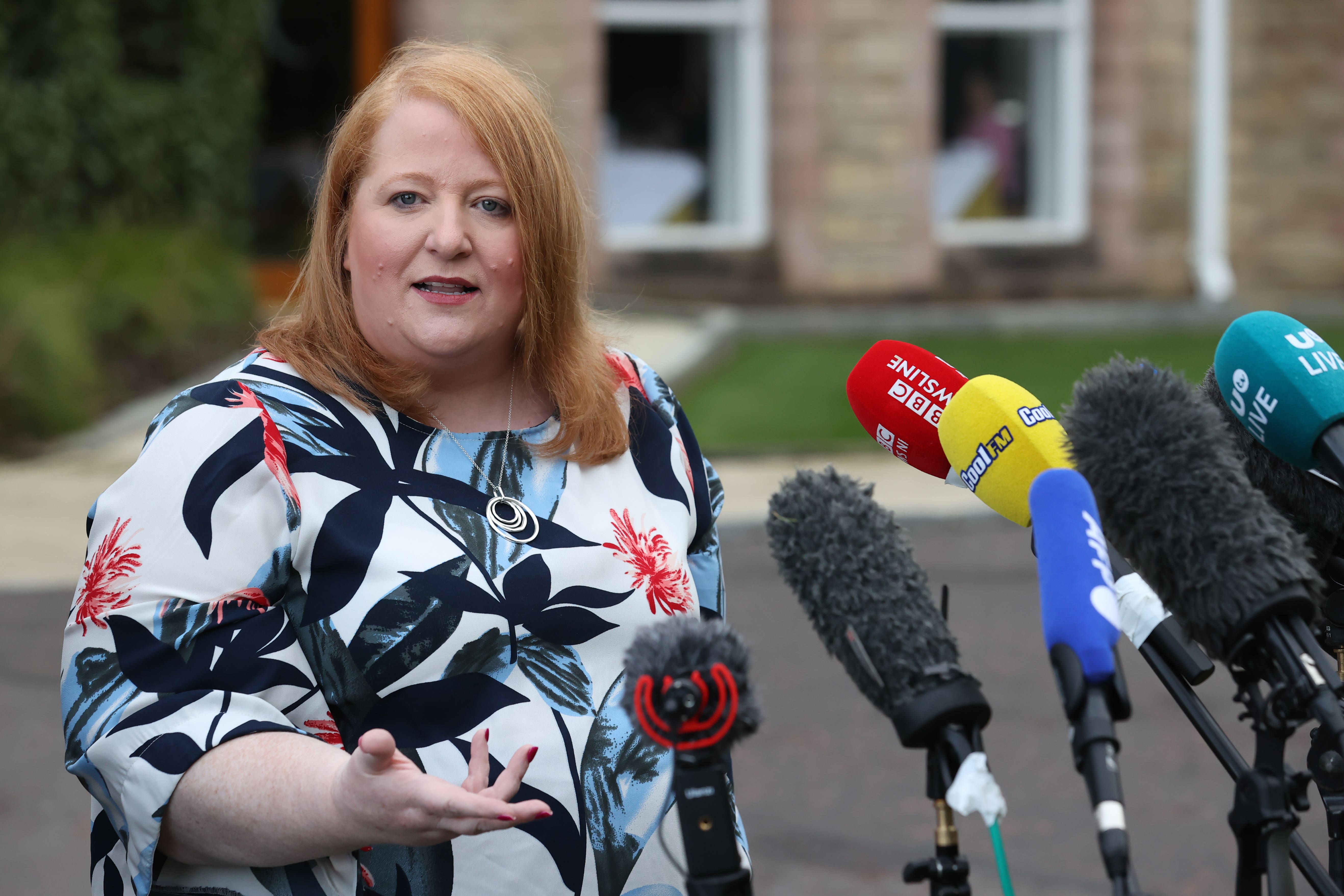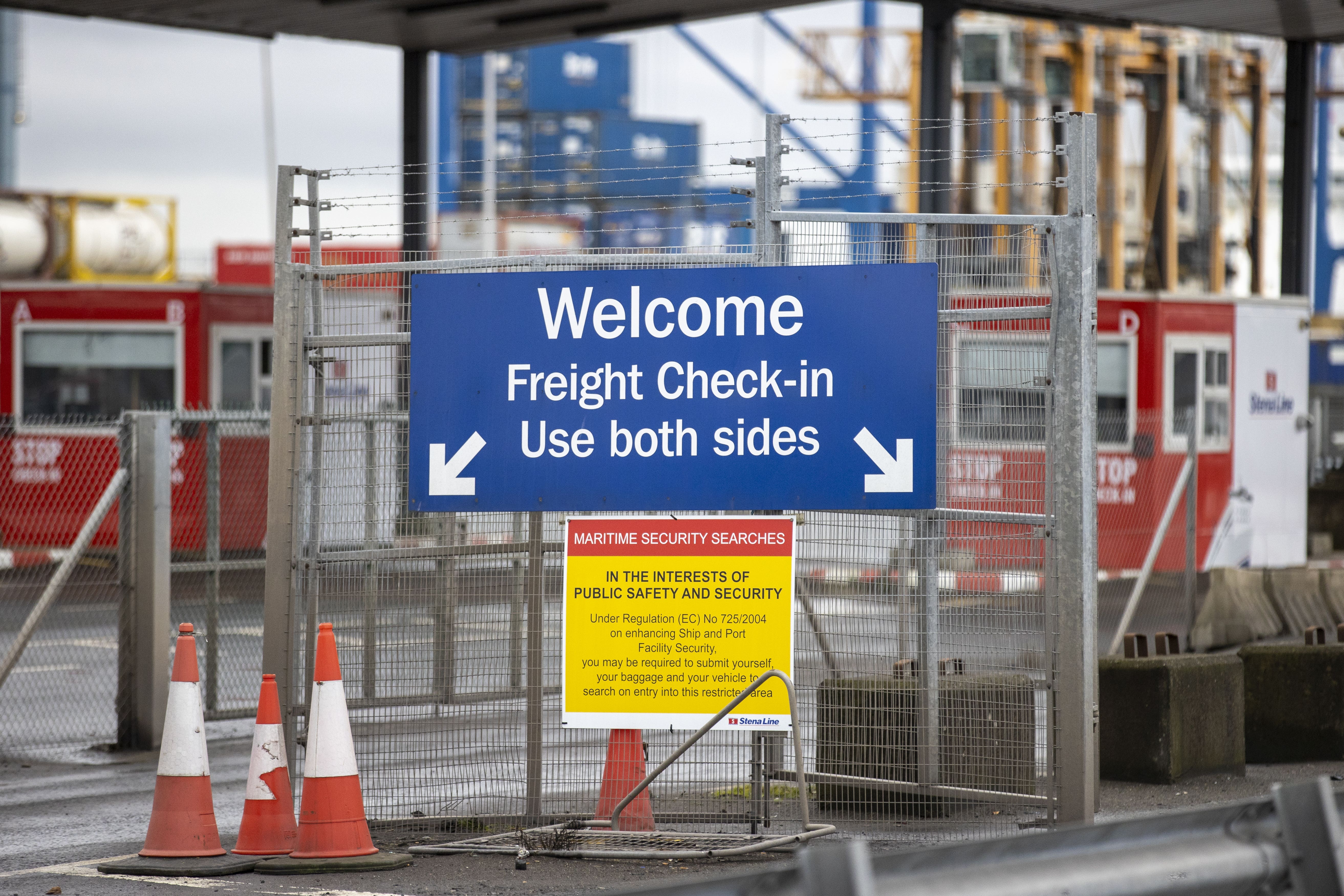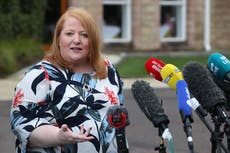Northern Ireland protocol: What today means and what is likely to happen next with Brexit
Rishi Sunak in Belfast as trade negotiations advance
Rishi Sunak flew to Belfast on Thursday evening to meet with Northern Irish political leaders as hopes grow that a new deal to reform the Northern Ireland Protocol can at last be reached.
Part of the Brexit deal the UK agreed with the EU in 2019, the protocol allowed Northern Ireland to stay in the EU single market but effectively created a trade barrier between Great Britain and the province across the Irish Sea, resulting in delays and disruption caused by increased bureaucracy.
The two sides have lately been engaged in negotiations led by Northern Ireland secretary Chris Heaton-Harris to smooth the process and resolve the political crisis that has erupted over the protocol’s implementation.
The five main Stormont parties – Sinn Fein, the DUP, Alliance, the Ulster Unionists and the SDLP – were invited for individual meetings with Mr Sunak at the Culloden Hotel on the outskirts of Belfast on Friday morning.
Sinn Fein president Mary Lou McDonald emerged from her sitdown with the prime minister saying that there were clear signs of progress on the protocol and that it was “very much game on”.
“It’s clear now that significant progress has been made and we’re very heartened by that,” she said.
“I think we’ve all seen in recent weeks certainly an upping of the pace of political engagement and activity. That, to our mind, is a very, very positive thing. It’s absolutely necessary that there is intensive goodwill, good faith work done between the parties.”
Alliance leader Naomi Long said the PM had been in listening mode and that there is “some heavy lifting still to be done” before a deal can be reached.
Doug Beattie, leader of the Ulster Unionist Party, also said he had had a positive meeting, calling Mr Sunak “enthusiastic, engaged and positive” but cautioning that any agreement could still be several weeks away.
Less cheerful was SDLP leader Colum Eastwood, who said the PM had offered only “scant” detail on what the agreement would actually hold and complained he had only been “ticking the box” by turning up, adding that he had impressed on Mr Sunak his belief that his country’s dual market access must not be sacrificed in any deal with the EU.
Following his visit to Northern Ireland, Mr Sunak will join European leaders in Germany over the weekend for the Munich Security Conference at which he will meet with European Commission (EC) president Ursula von der Leyen and where the protocol is very much expected to be part of discussions on the summit’s sidelines.
In another apparent sign of progress, UK foreign secretary James Cleverly will travel to Brussels for a meeting with EC vice president Maros Sefcovic.
So, should a deal be formed, what might it contain?
Details are indeed somewhat sparse at present but the UK is understood to have proposed the introduction of a “green” lane between Great Britain and Northern Ireland in order to speed up customs checks on food products and animal health.

UK negotiators have reportedly also conceded that the European Court of Justice (ECJ) will remain the ultimate arbiter of any protocol disputes, although there will be a stronger role for Northern Irish courts.
As The Independent’s Sean O’Grady has explained: “The changes to the protocol will probably be of a procedural and administrative nature, and not require a new protocol text, which in turn would require ratification by all 27 EU member states and raise the possibility of old arguments erupting all over again.
“If changes are made to the text, they will be minimal, for that same reason.”
DUP objections to the ongoing role of the ECJ in Northern Ireland’s affairs is likely to prove the real sticking point, it is feared.
Senior DUP politician Nigel Dodds has already warned that a failure to end the complete imposition of EU law in the province will ensure Stormont’s long-running power-sharing impasse continues.
Lord Dodds insisted that his party would maintain its block on devolution if an agreement falls short of the measures contained in the Conservative government’s own stalled draft legislation to unilaterally rip up the deal, a bill that appeared last summer when Boris Johnson was still in Downing Street but which has since failed to progress as a result of the political chaos in Westminster that followed his removal by his own MPs.
“We’re very, very not just disappointed, but angry at the fact that the government has stalled the Protocol Bill, which clearly they – Sunak, [Liz] Truss and Johnson – all said it was British government policy,” he told Italian newspaper La Repubblica.
“If Sunak doesn’t deliver what was promised in terms of the Protocol Bill… he will be deciding to cause the continuation of the impasse in Northern Ireland. It’s his choice, it’s not a question of trust in them. We just want them to fulfil the pledges they made.”

The unionists were frustrated earlier this month when a legal challenge arguing that the protocol was unlawful was rejected by the UK Supreme Court and will feel little incentive to help Mr Sunak but are likely to come under considerable pressure to accept a new deal rather than hold Stormont hostage, especially given that their nationalist and republican peers are broadly in favour.
SDLP MP Claire Hanna told BBC Radio Ulster this week: “I think there are people in the DUP who know they are on a hiding to nothing if they keep going further down this dark alley.
“We know this is hard, compromise is hard, none of the options are particularly brilliant, but just saying ‘no’ is no longer an option.”
Back in Westminster, Conservative moderates have urged Mr Sunak to get the deal done but hardline Tory Brexiteers within the European Research Group (ERG) are likewise opposed to an ongoing role for European judges within Northern Ireland.
ERG deputy chair David Jones has told The Independent: “If this is the basis of a deal then it will not work. We need to get rid of the protocol altogether… Any deal would be completely futile and embarrassing if it’s unacceptable to the unionist community.”
Mr Jones tweeted on Thursday: “The protocol won’t be fixed by displaying green and red signs and pretending the ECJ hasn’t got supreme jurisdiction in Northern Ireland when it manifestly has. NI must cease to be subject to laws made in Brussels. It’s as simple as that. Anything less won’t work.”
It remains unclear whether a vote in the House Commons on any deal with the EU will be necessary, although Labour Party leader Sir Keir Starmer has signalled the opposition will back a compromise, so Mr Sunak should avoid embarrassment even if the ERG does lead a major Tory rebellion.
Shadow justice secretary Steve Reed reiterated that support on Friday, telling reporters: “We’ll wait and see what the government is coming forward with. It’s very important for everybody in the United Kingdom that this problem is resolved. It’s a problem that is of this government’s own making, of course.”
He added: “Labour wants this problem fixed, so we are prepared to give Rishi Sunak the additional votes he needs to get this through Parliament and it’s important that the prime minister works with the Labour Party rather than listen to the extremists in his own ranks who do not want to resolve this problem that has caused a division inside our United Kingdom.”
Join our commenting forum
Join thought-provoking conversations, follow other Independent readers and see their replies
Comments


Bookmark popover
Removed from bookmarks